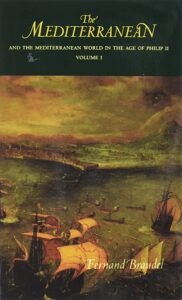Historical Laboratory Projects
The Annales School – Norton
There have been few schools of history from the twentieth century that have been as influential as the Annales school. From its beginnings in Strasbourg, France in the early part of the twentieth century, this house of history has changed how scholars study the past in numerous ways. The Annales school revolutionized the study of history by focusing on the common people as well as their mentalities.
Prior to the mid-twentieth century, the most important events analyzed in history were related to politics, diplomacy, and the military and the most important figures in history were those in power. The history of the common people was largely, but not entirely, neglected. In the aftermath of the American and French Revolutions through analyses of events like the Boston Tea Party and the storming of the Bastille prison, it began to be examined at a deeper level. However, political figures such as George Washington or Maximilien Robespierre were given more attention in historical literature at this time. The common people were acknowledged as a group and how they advanced the greater cause for which they were fighting, they were never acknowledged individually.
The hyperfocus on political and diplomatic history was especially evident in French history, even with the extensive coverage of the common people during the French Revolution. Two historians with the University of Strasbourg, Lucien Febvre and Marc Bloch, were disillusioned with this and began to write the scholarly journal Annales d’histoire économique et sociale. This journal, established in 1929, founded the Annales School of history. The Annales school was, and continues to be, highly interdisciplinary. Febvre’s doctoral thesis, Philippe II and the Franche-Comte, focuses on the geographical background of the region of Franche-Comte in eastern France and how it impacted social, political, and cultural development. Bloch’s main focus was on the material structures of society. In his book Feudal Society, he discussed not only medieval aristocracy and their land ownership, but the aristocracy’s relationship with peasants and their own customs of land and property ownership. Both scholars contributed to the later development of inter

est in mentalities and mental processes in the Annales school.
The second generation of the Annales school was led by Febvre’s protege, Fernando Braudel. In 1948, Braudel completed a three-volume total history of the Mediterranean region. This project that has since received many criticism for an ironic reason: the work did not focus on many different aspects of Mediterranean history. The protege also introduced the foundational concept of longue durée, which analyzes historical structures over a long period of time through the lens of geography, usually hundreds of years. Medium durée also analyzes historical structures, but over only ten to fifty-year long cycles. These cycles are more noticeable and are mainly concerned with economic cycles, population changes, and trade. The final aspect of time introduced by Braudel was histoire événementielle, which addressed more traditional political and diplomatic facets of history.
The third generation of Annales scholars, led by Emmanuel Le Roy Ladurie, focused more on mentalities rather than geography and structuralism. The study of mentalities addressed how people in a given time period in the past viewed the world around them. One of the major works from this generation of Annales scholars is The Cheese and the Worms by Italian historian Carlo Ginzburg. Ginzburg’s book studied the life of an Italian peasant named Mennochio, who was burned at the stake by the Roman Inquisition for heretical beliefs in the late sixteenth century. Mennochio himself was not a well-educated member of high-standing society. Because of this, many historians before Ginzburg would likely either ignore him entirely or briefly mention his name in a paragraph of a larger work. However, by studying Mennochio’s life and views in depth, Ginzburg was able to provide a window into the worldviews of Italian peasants at large. Through writing The Cheese and the Worms, Ginzburg popularized the genre of microhistory in Italy during the late 1970s. Microhistory has been widely associated with social and cultural history and continues to provide insightful analyses of the common people’s contemporary views of their world.
The Annales school is largely regarded as one of the most influential schools of history to originate from the twentieth century. Since its start,
